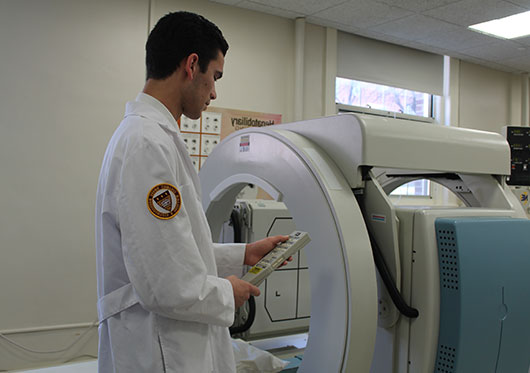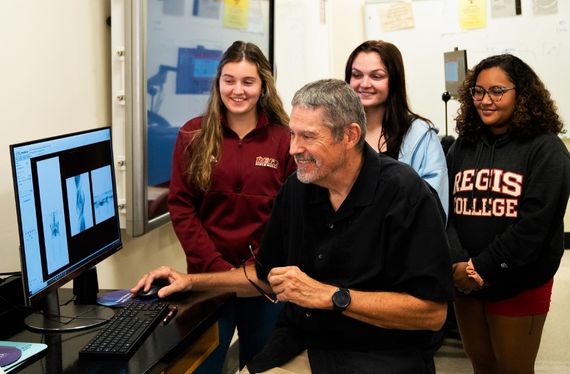Students in the Bachelor of Science in Nuclear Medicine program at Regis College combine courses in biology, chemistry, mathematics, and physics to use the tools needed to diagnose and treat a wide variety of health conditions, including cancer, heart disease, and neurological disorders.
The major combines course work with real-world, hands-on experiences inside classroom and clinical settings, allowing you to cultivate applied skills and the knowledge necessary for careers in not only nuclear medicine but several innovative health sciences and medical imaging fields. The major's curriculum will also prepare you for graduate school possibilities.
The program blends a strong foundation of technical skills with the traditional values of a liberal arts education. Students receive classroom as well as hands-on experiences in Regis’ state-of-the-art nuclear medicine lab before going to complete clinical rotations. Clinical rotations are at cutting-edge hospitals and medicals centers in or around Boston. Within these clinical studies you will collaborate with other medical professionals on interdisciplinary teams. Our experienced instructors will teach you how to utilize your critical thinking and problem-solving skills to make sound decisions and take corrective actions as needed.
As a nuclear medicine technology student, you will model the highest ethical standards and adherence to radiation protection standards and regulatory compliance.
Upon successful completion of the program, students earn a Bachelor of Science in Nuclear Medicine and are eligible to sit for the national certification board exams in nuclear medicine offered by the Nuclear Medicine Certification Board (NMTCB) and the American Registry of Radiologic Technologists (ARRT).
Program Outcomes
The nuclear medicine technology program will prepare graduates who:
- Select and implement appropriate exam protocols and scan parameters to provide high-quality diagnostic and therapeutic nuclear medicine/molecular imaging services.
- Assess the benefits and risks of radiation exposure to meet regulatory requirements, optimize patient radiation dose, and limit exposure to self and the general public.
- Apply knowledge of instrumentation to operate nuclear medicine/molecular imaging equipment and to perform standard quality control activities.
- Evaluate and analyze evidence-based research.
- Employ essential leadership and patient care skills to serve as a model of professionalism within the field of nuclear medicine/molecular imaging.
- Demonstrate mastery of the didactic knowledge required for the national certification board exams in Nuclear Medicine Technology offered by the Nuclear Medicine Technology Certification Boards (NMTCB) and the American Registry of Radiologic Technologist (ARRT).
Graduate Outcomes Report
Graduate achievement data is an indicator of program effectiveness, demonstrating the extent to which a program achieves its goals. The current report on graduate achievement data, identified by program, is available on the JRCNMT website.
The nuclear medicine technology program at Regis College is accredited by the Joint Review Committee on Educational Programs in Nuclear Medicine Technology (JRCNMT), 820 W. Danforth Rd, #B1 / Edmond, OK 73003; phone 405.285.0546; mail@jrcnmt.org; jrcnmt.org. This program is currently on probation but it is accredited. For more information go to JRCNMT online directory of accredited programs and read the accreditation letter linked to the program’s directory listing (jrcnmt.org/find-a-program/). Implications of attending a program that is on probation are available at jrcnmt.org/students/program-on-probation-faqs/.
How Will You Rise at Regis?
What Does a Nuclear Medicine Technologist Do?
The nuclear medicine technologist works directly with patients to acquire and prepare images for interpretation by a nuclear medicine physician, radiologist, or cardiologist. The major responsibilities of the nuclear medicine technologist include:
- Ensuring the proper function of imaging equipment
- Preparing and administering radiopharmaceuticals
- Positioning patients for imaging examinations
- Following standardized protocols to obtain necessary images
- Optimizing the diagnostic quality of images with computer processing applications



